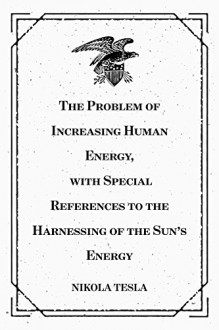The Problem of Increasing Human Energy, with Special References to the Harnessing of the Sun's Energy
by:
Nikola Tesla (author)
Nikola Tesla was one of history’s greatest scientists, and though he is best known for his pioneering work with electricity, the fact that he is mostly remembered solely for that actually does a disservice to his legacy. Born a Serb in the Austrian Empire, Tesla came to the United States and...
show more
Nikola Tesla was one of history’s greatest scientists, and though he is best known for his pioneering work with electricity, the fact that he is mostly remembered solely for that actually does a disservice to his legacy. Born a Serb in the Austrian Empire, Tesla came to the United States and worked in a laboratory for none other than the Wizard of Menlo Park, Thomas Edison.It was through his work on behalf of Edison that Tesla flourished and became a well-known figure in his own right. His work there helped him establish financial backing for his own projects, particularly the design of AC (alternating current) as a system for supplying electricity. This later put him at odds with Edison, who championed DC (direct current), but Tesla’s model would come out on top as the 19th century came to a close. Having established AC as an electrical supply system, Tesla became a global celebrity, and his devices and inventions fascinated people. Tesla tinkered with everything from X-rays to wireless communications and even attempted a primitive form of the radio. While Tesla was not able to successfully execute the devices and concepts he foresaw, his forward thinking in fields like wireless communication certainly proved prescient, and his futuristic devices and his later reputation for eccentricity helped create the “mad scientist” image that still remains a pop culture fixture. Tesla seemed to have come to grips with this aspect of his legacy late in life, noting, “The scientific man does not aim at an immediate result. He does not expect that his advanced ideas will be readily taken up. His work is like that of the planter — for the future. His duty is to lay the foundation for those who are to come, and point the way.”
show less
Format: Kindle Edition
ISBN:
9781518309991
ASIN: B018BS0IZE
Publish date: 2015-11-23
Publisher: Firework Press
Pages no: 64
Edition language: English

